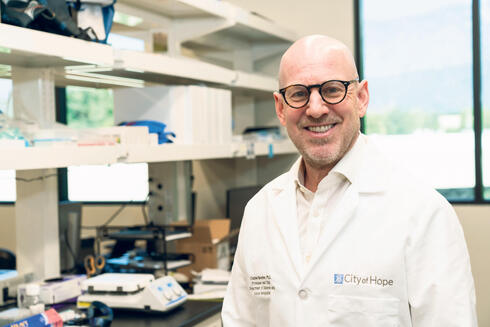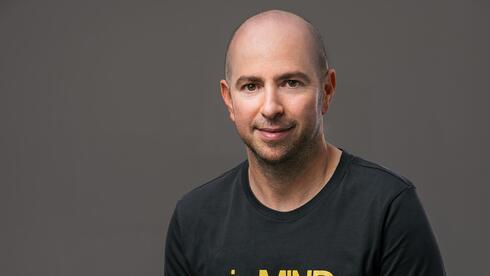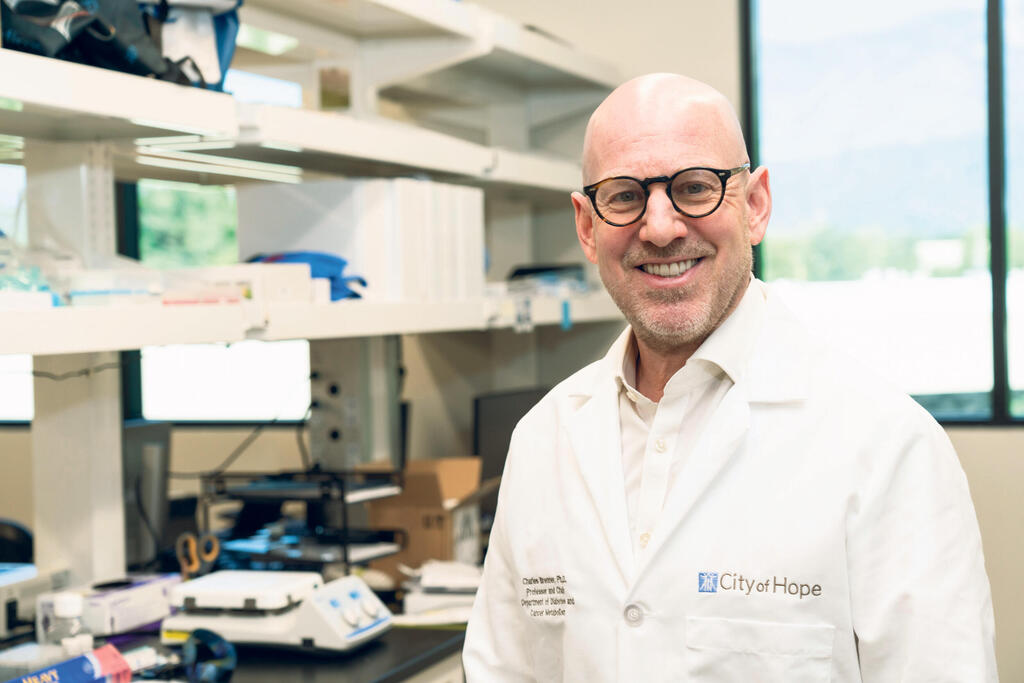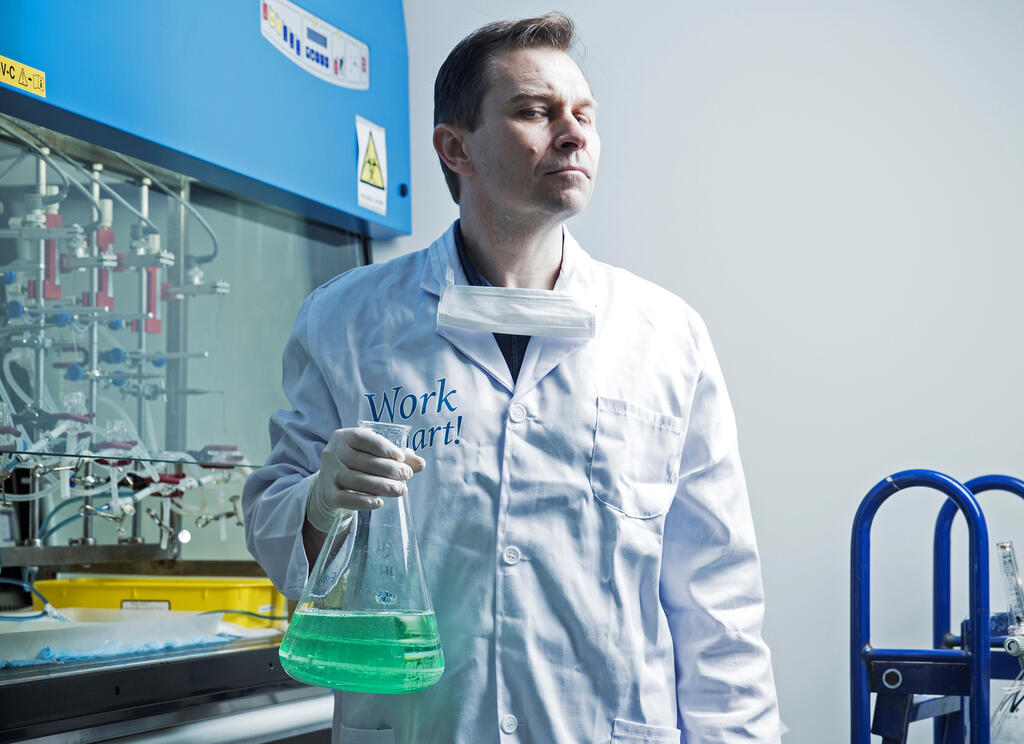
"We won't get eternal life. Scientists who promise it are just selling BS"
Forget about anti-aging treatments or drinking red wine. Prof. Charles Brenner bursts the balloon inflated by the booming longevity industry, and explains why there is no way to defeat death
Last September, the best minds in the longevity industry gathered in the pastoral town of Gstaad in western Switzerland to showcase their products to international investors. One by one they took the stage and talked about breakthrough technologies that delay aging. One spoke about treatments based on mitochondrial-derived peptides, another spoke about next-generation artificial intelligence technologies for drug discovery, and a third spoke about mapping aging cells in order to prevent their deterioration. But then American biochemist Prof. Charles Brenner entered the stage and ruined the party.
Brenner, 61, is an award-winning researcher and the Alfred E Mann Family Foundation Chair in Diabetes and Cancer Metabolism in the Department of Diabetes & Cancer Metabolism of the City of Hope National Medical Center. He rose to fame when he discovered the vitamin nicotinamide riboside (NR), which is found in yeast and humans, as an unanticipated vitamin precursor of NAD- that increases the activity of muscle stem cells in elderly mice and thus extends their lifespan. In 2018, Brenner showed that taking the enzyme orally protects mice from heart failure, and today this discovery is at the center of dozens of clinical studies around the world, which examine its activity in processes such as recovering from Covid-19, neurodegeneration, fatty liver disease, kidney disease, and more.
However, over the last two years Brenner has changed his stripes, becoming known in the industry as the "longevity skeptic." At conferences, interviews and on his Twitter account (his description reads "No BS zone") he breaks down study after study from the trendy field of longevity and refutes it. From his podium in Gstaad, Brenner mentioned the Greek historian Herodotus, who wrote some 2,500 years ago that he discovered the fountain of youth, and that anyone who drank from it or bathed in it would remain forever young, but suspiciously never revealed its location. Brenner says that we should direct the same suspicion towards prominent scientists, who establish tech companies and make promises of an equally unsubstantiated fountain of youth.
Now in an interview with Calcalist, Brenner explains why he is challenging the industry that made him famous, "I don’t foresee technological developments that will significantly extend maximum life expectancy and I certainly don’t foresee eternal life. Scientists who promote such innovations greatly exaggerate the ability to extend life expectancy, and they will continue to promise too much and deliver too little."
The studies of these scientists are peer-reviewed and published in the most prestigious journals. How do you explain that?
"There is a perverse incentive structure in science to claim the most exciting things, including discoveries that will not only interest scientists but make the front pages of newspapers and magazines. Anxiety about aging means that there’s a willing audience. There’s been hype about aging for thousands of years. So no, I don’t believe that Methuselah lived for over 900 years, nor do I believe that the latest claims about mice aging are likely to be replicable.”
How was the reaction to your lecture?
"I've had dozens of people approach me saying things like: 'I need you to help me evaluate this technology', 'do you do any consulting?' etc. And one of the prominent scientists in the field came up to me, upset, and said that I shouldn't raise these kinds of questions in front of investors."
You can understand what alarmed the scientist. After all, the longevity field is probably the hottest field in the biotech industry, already attracting high-profile investors such as Jeff Bezos and Peter Thiel. Investments in startups in the field are expected to jump 15 times in the next two years from $40 billion a year to $600 billion.
But Brenner is not impressed by the hype. On the contrary - he calls some scientists who support the industry “obfuscators,” and himself a ‘“clarifier.” "Some of the money going into aging research is based on the premise that aging is the cause of all diseases, therefore instead of studying diseases in general, we should focus on the study of aging. The obfuscators will tell you that we understand aging and that you should invest now because it’s the most important thing that you could work on in biomedicine. This hypothesis has not been proven, and yet, it's become almost like a religious belief.”
The greatest problem in the field, explains Brenner, is that there is a consensus perception that aging is a disease in itself, and there is disagreement only about identifying its underlying causes. “Aging is not a disease, but a normal process that all of us go through at the end of our fertility phase. Its processes are nuanced, and therefore complicated. Things are not as easy as you have been led to believe - that if you do this and that, you will not age. There's a profit motive that has to be dissected. There's BS that has to be identified. And there are storytellers who have a skillset that is very appealing to people.”
Aging isn’t controlled by single genes
In one of his latest papers, Brenner touches on the heart of his argument against the possibility of living forever. He wrote about how all vertebrates have a natural lifespan limited by their genetic makeup, and that it seems that the upper limit of human lifespan is 120 years. He noted that the gene sets of animals have evolved to allow them to obtain food, evade predators, find mates and reproduce successfully. For animals that can mate several times, longevity is a consequence of the ability to continue to do everything necessary to reproduce and promote the success of the offspring. Indeed, experiments on flies that breed late in their lives indicate that hundreds and thousands of genes—not single dominant genes—mutated to allow all of their entire organ systems to function better over time.
And, this is the crux of the matter according to Brenner. "There is no simple, compelling longevity tech right now, because longevity is highly polygenic. Are there single genes that can extend life in animals? Yes, but these are mutations that cause a loss of function, such as the loss of growth hormones that create a small, barren mouse that cannot compete for food - these are not genes you want more copies of. Is it relevant for humans? No.
“I live next to Hollywood, and there are people in the film industry that live in my area. If you want to gain a lot of muscle mass and look great for your next movie shoot, you might take anabolic steroids or growth hormones, because it will give you a youthful ability to gain muscle mass. But we know genetically that this accelerates aging.”
But why can't we defeat old age? After all, we managed to almost two-fold life expectancy in the last 150 years.
“That happened due to public hygiene, sewage systems and vaccines, which helped us live longer. We also know that high physical and mental activity, social engagement, good nutrition, water as your main beverage, avoiding drugs and alcohol, avoiding smoking, avoiding violence, are also very important. But I don’t think there’s any magic to healthy living. It’s mostly following your mother’s advice. Eat your vegetables!”
The field is saturated with studies - none of them are relevant?
“I don't think that there's going to be monogenic longevity genes that are going to be actionable. Could there be drugs that are helpful? Yeah, maybe. But you're going to have to test them, and in new ways.”
Brenner explains that clinical studies on longevity would need to run multiple years to reach meaningful conclusions. And he has quite a few examples of holes in current research to prove his point. For example, he says, "Prof. Nir Barzilai is very active in promoting the testing of metformin. But from my point of view, metformin is a type 2 diabetes drug and there's little evidence that it would benefit nondiabetics. Another example is rapamycin, an autoimmune drug that helps mice live longer, but there's some evidence that it would blunt the beneficial effect of exercise for humans, and the preservation of skeletal muscle mass is almost the most important thing that we can do.”
The bottom line according to Brenner is, "Instead of chasing age reversal, we need to focus on healthy aging - to live in good health into our 90s and 100s."
Head to head against the lead obfuscator
Charles Brenner was born in Boston, a self-identified Ashkenazi Jew. Three of his grandparents immigrated to the United States around the time of the First World War . He studied molecular biology as an undergraduate at Wesleyan University, worked for five years in the biotech industry, and then completed his PhD in cancer biology at Stanford. In 1996 he started his labratory at Thomas Jefferson University. Seven years later, he moved his research group to Dartmouth College, where he rose to be professor of genetics and associate director for basic science at the Dartmouth Cancer Center, and in 2009 he moved to the University of Iowa, where he headed the biochemistry department. Since 2020 he has been at City of Hope in Los Angeles.
Already a noted biochemist, Brenner’s 2004 discovery of NR as a vitamin precursor of NAD, launched him into the next level of researchers, who are invited to give keynote presentations and receive major awards. Brenner was the recipient of the Lands Lectureship (2007), Fellowship status with the American Association for the Advancement of Science (2013) and the American Society for Biochemistry and Molecular Biology (2023), and the Mary Swartz Rose Senior Investigator Award from the American Society for Nutrition (2020) among others.
In the last decade, Brenner's research has shown the benefits of taking NR orally for conditions such as fatty liver disease, obesity, type 2 diabetes, heart failure and more, in animals. He also led the first clinical trial of NR, which showed it to be safe for humans, and is now focused on clinical trials for metabolic stress in humans. Since 2014, he has served as scientific advisor to ChromaDex, the California based company that licenced and deveolped his patent for NR as an NAD precursor.
Despite this, Brenner refuses to over promise or be promotional about the potential inherent in NR: "In some cases, NR is useful in improving recovery capacity and resistance to metabolic stress situations, but I wouldn't call it a medicine for longevity," he explains.
Brenner, as mentioned, is a "clarifier," who does not want to foster false hopes, like the "obfuscators" with whom he is fighting. And of all the obfuscators in the world, he is most at odds with Prof. David Sinclair, co-director of the Aging Research Laboratory at Harvard University, entrepreneur of more than 20 companies in the field and president of the American Academy for Health and Lifespan Research. Sinclair became an anti-aging guru thanks to the "Information Theory of Aging," a theory he developed, which holds that within a few decades we can reboot our genome and add an additional several decades to the human lifespan. This, in turn, will buy us time for the next innovations in the field, and from there to eternal life the road is short. Sinclair presented his theory in his best-selling book "Lifespan: Why We Age, and Why We Don't Have To", which was translated into more than 20 languages and was called "brilliant and fascinating" by the Wall Street Journal. But Brenner calls this book "an important and influential source of disinformation," and Sinclair himself a "fabulist."
Sinclair's star rose in 2003 - the same year as Brenner - due to his claims that resveratrol, a molecule found in red wine, activates sirtuin, which he claimed extended lifespan in yeast and animals. A year later, he founded the biotech company Sirtis Pharmaceuticals, which was designed to translate the discovery into a commercial product. In 2008 the company was sold to British pharmaceutical corporation GSK for $720 million, making Sinclair a very rich man.
Brenner served on the scientific advisory board of Sirtis, and according to him it was an "eye-opening" experience, and not in a positive way. Some of the board members, including himself, expressed concern that they were not given full access to the data. His doubts continued, and later studies began to be published that disproved Sinclair's discovery. The impact was so dramatic that within five years GSK closed Sirtis.
Sinclair did not give up and in 2013 he published another study that he claimed confirmed his discovery. But the scientific community was not impressed. In the last year and a half, there have been even more questions surrounding Sinclair's activities and research, and he is subject to increasing criticism.
Brenner calls the resveratrol affair "a deep stain in the history of science…because people haven't been paying attention, and because Sinclair and his people are so good at storytelling and manipulating members of the media and public.”
Can you explain further?
“There's this weird phenomenon in science, where there are three highly prestigious journals - “Nature,” “Cell” and “Science,” which occasionally publish exciting bullshit. For example, in 1989 Nature published a paper on cold fusion and it was a mistake. And there are many other examples.
"When Sinclair identified resveratrol in 2003, Prof. Leonard Guarente, who was the director of a laboratory at MIT, published a paper saying that not only is Sir2 a longevity gene in yeast, it is a longevity gene in worms. We now know that this is not a reproducible result, but it was all over the New York Times.
“The problem with those journals is that they can sometimes be more interested in the media hype and the exciting possibilities than the rigor of the research. If you want to publish a paper on hardcore biochemistry, there are certain basic things that you need to do. Like if you say that compound X is an inhibitor of enzyme Y, the Journal of Biological Chemistry reviewer will expect that you demonstrate a physical interaction between the inhibitor and the enzyme. But David wasn't asked to show a physical interaction by the reviewers of Nature because he told this amazing story about the French paradox (a nickname for the apparent contradiction between the high-fat diet and the low mortality from heart disease in France). So it's all rhetoric, like putting on the back of your book: “what if aging is a disease and that disease is treatable?” “What if you could play football with your great, great, great, great, great, great grandchildren?” “What if you could have a new career at the age of 85?” “What if you could have babies at the age of 90?” But that’s counterfactual rhetoric and is BS.”
Why is it BS?
“Let’s talk about sirtuins. An analysis of the work reveals that in yeast, sirtuin genes help 1 in 5 million cells live longer in one model of aging whereas they shorten lifespan for the entire culture. And even if it were to lengthen the lifespan of the entire culture, yeast is not the right model for studying aging: does yeast have a mother and father? Does yeast have fur? Does it have a brain? Does it have to avoid predation? Does it have to have sex appeal to be able to reproduce? Does it have to have muscles? Does it have to have a respiratory system?”
In 2013, Sinclair published an article that seemingly confirms that resveratrol is beneficial in humans.
“No, he didn’t. His 2013 paper was a very narrow study claiming that resveratrol binds SIRT1 to humans. He never showed that it’s ‘beneficial’ to humans. On top of that, that’s another peer review failure, because if that paper is true, then the original Nature paper can't be true, because it's contradictory. The amino acids in the human protein that he identified aren't present in the yeast protein, so it doesn’t make sense that that’s how he identified it. Sinclair created this bizarre set of papers that refer to each other as if they’re building blocks, but each one is basically contradicting the previous one. It’s a total house of cards - it’s phenomenal.”
But Sinclair does not only promote research on resveratrol, but also, for example, research on Yamanaka Factors - genes discovered by Nobel laureate Prof. Shinya Yamanaka, which can transform mature cells into stem cells.
"All of the three Yamanaka factors that Sinclair is using are oncogenes, meaning they are likely to cause tumors. In order to evaluate their safety, even in mice, you'd need much larger numbers of mice, and you'd need to perform it blind, so that you'd have treatment A versus treatment B and you'd have no one invested in the outcome and you publish the result no matter what.
“I don't see that kind of practice in his lab. What I see is a story. And sometimes he even says, ‘Hey, I predicted this in yeast in 1997’ or ‘I put this in my book in 2019,’ or ‘I have an illustration of this phenomenon that I put in my lab notebook 20 years ago,’ like he's a prophet. I find his research very problematic and given his history as an obfuscator, I don't understand why people continue to invest in him and collaborate with him.”
Sinclair did not respond to Calcalist’s request for comment.
In a previous interview with Brenner, Sinclair insisted that Siruins play a role in the aging process. “There are dozens of papers showing the benefits of raising NAD are lost when [sirtuins] are deleted,” he told Nautilus in May. “It’s not just in mice. When you overexpress [sirtuins] in worms, in flies, in yeast, it extends lifespan. And so it seems to be a conserved effect that some of these sirtuins are limiting for lifespan, and that if you give the organism more of them, they’re healthier and live longer.” Guarente, too, said that a large volume of published research links aging and sirtuins, “cementing their role in longevity and health.”
Don't end up like a dwarf mouse
Brenner isn't the only one happy to stick a pin in the burgeoning longevity industry. "This field is the focus of quite a bit of controversy, mainly because there is still not enough basic research to explain what aging is," explains biochemist Prof. Howard (Haim) Ceder from Hebrew University, one of the fathers of the field of epigenetics. "Aging is a serious and complex problem, in which many things happen, and no one knows what the first, second, or even third thing that happens is, what the source is, or what the results are. But many researchers who work on aging, and Sinclair in general, are not interested in the basis - they are interested in what they can do, and it just doesn't work that way, especially on such a complicated subject.
"It's like someone claiming that metabolism is a solved problem, when it's an endless subject, with thousands of genes involved in it - there is no solution to metabolism, and there is no solution to aging. Both in mammals and in other creatures, researchers have found that all kinds of treatments, such as changing the diet or the environment, may have an effect on life expectancy, but this still does not reach the source of aging. Good science on longevity is one that puts the emphasis not on life expectancy, but on the quality of the body's cells."
However, of all the voices in the scientific community that have come out against the longevity industry, it seems that no one is as sharp and blunt as Brenner, who dares to speak out against an industry worth billions with powerful influence.
I imagine that you’ve upset a lot of influential people. Doesn't that concern you?
“I was castigated by one scientist for publicly calling BS on the state of human aging research but I’ve been thanked by hundreds. I’m 100% comfortable with being direct and honest.”
What made you enter the arena and speak publicly on this issue? Why does this upset you so much?
“There is a very strong interface between sirtuins and NAD biology, which is one of my primary areas of research. There's this kind of base assumption that sirtuins are longevity genes and I kept being asked about it. I felt like it was incumbent upon me to review the data. I was asked by a faculty member at Maastricht University to give a guest lecture on NAD in aging. When I looked at that course outline, I felt like a lot of the underlying premises of the course were flawed and were things I couldn't support, so I wanted to take a few steps back and ask students questions like: What do we know about animals? What genetic traits are selected in animals? How do animals age? What are sirtuins and why do we think that they have a role in aging? Do they really have a role in aging?”
You say that the scientific journals cannot be trusted because of failed peer review, and that the mass media cannot be trusted because they are not an indication of scientific rigor. Given such circumstances, how can readers know which side of the argument they should support?
“Sinclair claimed that sirtuins are authentic longevity genes in humans and that by increasing their activity with NAD-boosters you don’t have to age. Do you know who first showed that NR increases the activity of SIR2 in yeast and extends yeast lifespan? That was my lab’s paper in 2007. And do you know who developed the original intellectual property on uses of NR? I did. If I didn’t care about honesty, it would be very easy for me to get on the sirtuin train and support this narrative.
“Sinclair has known since 2005 that in the other yeast model of aging, SIR2 does not extend lifespan and if he doesn’t understand the differences between yeast aging and human aging, he doesn’t deserve to be a high school teacher let alone a Harvard professor. He’s still trying to sell resveratrol 18 years after it was debunked as a sirtuin activator. He’s claiming that the three Yamanaka factors he works with are not oncogenes when every scientist knows they are and he’s selling people supplements for their dogs without even saying what’s in them. I’m a guy that tells it like it is and doesn’t tell people fictional stories masquerading as science.”
So there is nothing to do to combat aging? It sucks to think that we won't find any cure for it.
“The most high tech thing you can do is vaccinate, and the most important thing you can do is exercise. There is no additional longevity tech right now for people, but believe me, you wouldn’t want to be a dwarf mouse that ages more slowly but can’t compete for its own food.”
First published: 15:16, 14.07.23















